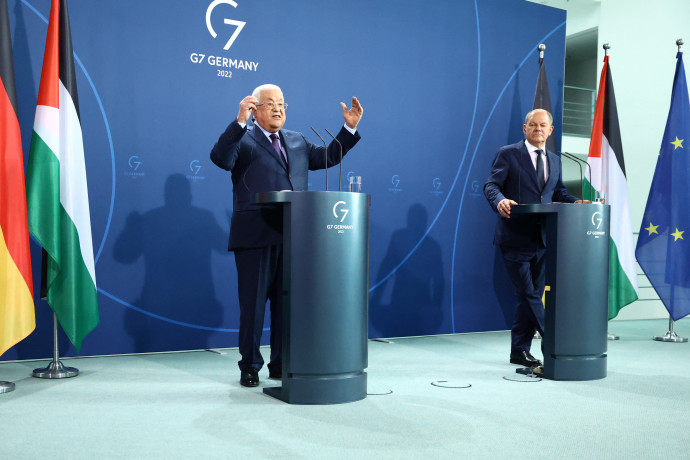Palestinian Authority President Mahmoud Abbas says Israel is responsible for “50 holocausts” against his people. Speaking in Germany, that was his response when asked if he would apologize for the killing of 11 Israeli Olympic athletes and coaches in an attack there by Palestinian terrorists in 1972.
For more stories from The Media Line go to themedialine.org
Israeli and German leaders are expressing disgust, outrage, and revulsion at the comparison of Israel’s treatment of the Palestinians with the Nazi murder of 6 million Jews in the Holocaust during World War II.
What Abbas said was: “If you want to look at the past, go ahead. … I have 50 massacres that were committed by Israel. 50 massacres, 50 slaughters, 50 holocausts” against the Palestinians. The problem wasn’t in the translation.
He said “holocausts” in English. So, disgust, outrage, and revulsion. What no one is expressing is surprise. There are two main reasons for this.
First, Abbas is known as a Holocaust denier. He isn’t – it’s worse than that.

Second, this cannot have any impact on efforts for peace negotiations between Israel and the Palestinians, because there is no point in such efforts anyway. Abbas is the one who refused to sign on a map setting up a Palestinian state in the equivalent of all of the West Bank, Gaza Strip, and parts of Jerusalem – just what the Palestinians have been demanding.
That was in 2008. And Abbas wasn’t even the first. His predecessor, the legendary Yasser Arafat, turned down a similar offer in 2000. So, the vaunted, almost holy, bilateral Israel-Palestinian peace process reached its logical conclusion with a viable peace offer not once, but twice – but it didn’t bring peace.
You know what they say about someone who tries the same failed move over and over again, expecting different results.
There are those who believe that Abbas is still the moderate hope for peace, a barrier against the radical, violent Islamist Hamas
His own history dictates otherwise, and it emerged loud and clear in Germany this week.
Abbas did not deny the fact of the Holocaust this week, and he has not done so in the past, though he has argued about the numbers. “All” he did was blame the Jews for the Holocaust. That’s arguably worse.
His 1982 doctoral dissertation is titled “The Other Side: The Secret Relationship Between Nazism and Zionism.” There, he puts forward the baseless and revolting claim that Jewish leaders egged the Nazis on to massacre Jews in order to expedite the move of surviving Jews to Palestine.
He called the Zionists and the Nazis “partners in crime.” Never mind the fact that the Middle East figure spurring the Nazis to massacre the Jews was Haj Amin al-Husseini, the Palestinian Muslim religious leader who traveled to Berlin himself on his unholy mission.
Even today, the “Israel as Nazis” equation features often in Palestinian media
And Abbas says he has 70 more books ready to publish about the partnership between the Zionists and the Nazis.
We could chalk all this up to ancient history if it weren’t part of the pattern plaguing the Palestinians for decades – the victimization image, the idea that only Israel is responsible for their plight, that Israel is the one with all the power, and the poor Palestinians have no say in the matter. As shown in 2000 and 2008, they do have a say.
They said “no.” Since then, things have gotten worse for both Palestinians and Israelis, if you look at this bilaterally. Israelis have moved on from regarding the Palestinian issue as their number one problem.
Ahead of the election set for November, polls show that the top concern of Israeli voters is rising prices and the cost of living. That said, extreme nationalistic Jewish parties are doing well and could form a government with elements that also oppose concessions to the Palestinians or the creation of a Palestinian state – even if that issue is not their top priority.
Meanwhile, Israeli settlements in the West Bank continue to grow, without attracting much attention even in Israel. When Arafat turned down the 2000 offer, there were about 100,000 Israelis living in the West Bank.
Today there are more than 600,000, including east Jerusalem. The Palestinians have become mired deeper and deeper in their kleptocratic, corrupt government, which has become more autocratic as the years progress.
Abbas has little popular support, and he refuses to call elections (he’s in the 18th year of a four-year term) because he knows a Hamas leader would likely be chosen to replace him.
But it’s time to stop looking at this problem bilaterally
It has become a regional issue, and that does not portend well for the Palestinians. Palestinian leaders complain that they no longer seem important on the world stage.
That’s because, objectively, they’re not. Arab states have moved past waving the Palestinian flag as a way of distracting their people from their own problems and bashing Israel at the same time. Instead, in one form or another, many Arab nations are forging ties with Israel.
The foreign “true believers” behind the Palestinian cause are being left noisily behind or exposed for their true anti-Semitic intentions.
The time may yet come when a coalition of Mideast nations decides they’ve had enough of this little Israel-Palestinian squabble and put an end to it. It could take the form of dictated borders and arrangements, enforced on the ground if necessary. Many Israelis and Palestinians would welcome that.
But it means giving up on the dream of Israelis and Palestinians walking arm-in-arm into a peaceful, fruitful future. This week in Germany, where the Holocaust took place, Mahmoud Abbas showed us again why that is just a pretty illusion.
